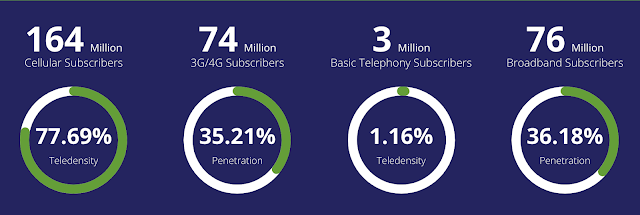PakAlumni Worldwide: The Global Social Network
Pakistan Federal Board of Revenue has recently announced that “Sales Tax and Income Tax at import stage has been drastically reduced in case of smartphones of Rs15,000 or below". This action was apparently taken after Digital Pakistan Initiative led by Tania Aidrus asked for it. It has come under fire from the country's nascent mobile phone and smartphone manufacturing industry which is producing low-cost mobile phones. Pakistan's mobile handset market is the 8th largest in the world. Current annual demand is for about 40 million units of which 13 million are assembled in Pakistan while the rest are imported, according to a report by Dunya News. The import bill for Fiscal Year 2020 is expected to be about $1.2 billion. Boosting it will save billions of dollars of precious foreign exchange. It will create tens of thousands of jobs and spawn new auxiliary manufacturing industries for chargers, headphones, USB cables, cases, etc. In future, Pakistan could become a significant exporter of mobile handsets.
Mobile Phone Demand:
There are currently 164 million mobile phone users in Pakistan, the 8th largest in the world. The current annual demand for mobile phones in the country is estimated at about 40 million units, according to Pakistan Telecommunication Authority (PTA). The fastest growing demand is for 4G smartphones.
According to Pakistan Bureau of Statistics, mobile-phone imports (HS Code: 8517.1219) reached $498 million in 5 months period from July to November 2019, 64% jump over the prior year. Fiscal 2019-20 imports are expected to reach $1.2 billion.
Earlier, the growth rate for 4G handsets jumped from 16% in 2018 to 29% in 2019. Imports of mobile handsets soared 69% from $ 364 million in 2018 to $ 615.7 million in 2019. Pakistan is world's seventh largest handset importer and the 8th largest mobile phone market.
Domestic Manufacturing:
Pakistan Telecommunication Authority (PTA) has granted permission to 26 local companies for manufacturing out of which 15 are currently in production. Among those currently producing mobile handsets in Pakistan are: E-Tachi, GFive, Haier, Infinix and Tecno. They are producing 13 million mobile phones.
Domestic manufacturers claim that they can meet 80% of demand for mobile handsets over the next 2 to 3 years if they are sufficiently protected by higher tariffs on imports.
Domestic mobile phone manufacturing industry will save billions of dollars of precious foreign exchange. It will create tens of thousands of jobs and spawn new auxiliary manufacturing industries for parts, chargers, headphones, USB cables, cases, etc. In future, Pakistan could become a significant exporter of mobile handsets.
Summary:
Pakistan's mobile handset market is the 8th largest in the world. Current annual demand is for 40 million units. Domestic plants produce 13 million units while the rest are imported. The import bill for Fiscal Year 2020 is expected to be about $1.2 billion. The country's nascent mobile handset manufacturing industry fears a serious early setback if the FBR decision to lower duties on imports of foreign made mobile phones is not reversed. It is being blamed on Tania Aidrus, Prime Minister Imran Khan's advisor on Digital Pakistan Initiative, who would like to increase availability of mobile handsets. Domestic mobile phone manufacturing industry will save billions of dollars of precious foreign exchange. It will create tens of thousands of jobs and spawn new auxiliary manufacturing industries for chargers, headphones, USB cables, cases, etc. In future, Pakistan could become a significant exporter of mobile handsets.
Related Links:
Public Sector IT Projects in Pakistan
Pakistan's Gig Economy 4th Largest in the World
Afiniti and Careem: Tech Unicorns Made in Pakistan
Pakistani American Heads Silicon Valley's Top Incubator
Silicon Valley Pakistani-Americans
Digital BRI and 5G in Pakistan
Pakistan's Demographic Dividend
Pakistan EdTech and FinTech Startups
State Bank Targets Fully Digital Economy in Pakistan
Fintech Revolution in Pakistan
The Other 99% of the Pakistan Story


Riaz Haq
Local mobile phone manufacturing rises 28pc MoM in December
https://www.thenews.com.pk/print/1280447-local-mobile-phone-manufac...
On a quarterly basis, local production climbed to 8.79 million units in the fourth quarter of 2024, marking a 67 per cent rise compared to 5.25 million units in the third quarter. This surge pushed the total annual output for 2024 to 31.38 million units, reflecting a 47 per cent year-on-year (YoY) increase, primarily driven by import restrictions imposed last year.
Despite this remarkable recovery, the YoY growth compared to 2022 remained at 43 percent, bolstered by factors such as economic stabilisation, a growing preference for locally assembled mobile phones amid higher taxes on imports, and a steadily increasing population, said Sunny Kumar, an analyst at Topline Research.
Out of the 31.38 million locally assembled mobile phones produced in 2024, smartphones accounted for 59 per cent (18.64 million units), while the remaining 41 per cent (12.74 million units) were 2G feature phones.
The top 10 brands contributing to local assembly included Infinix with 3.98 million units, followed by Itel (3.64 million units), VGO Tel (3.37 million units), Tecno (2.85 million units), Vivo (2.77 million units), Xiaomi (2.35 million units), Realme (1.76 million units), Samsung (1.51 million units), G’Five (1.44 million units) and Nokia (1.36 million units).
The data further revealed that local manufacturing fulfilled 95 per cent of the country’s mobile phone demand in 2024, compared to an average of 67 per cent over the past five years (2019-2023) and 47 per cent over the past eight years (2016-2023).
According to Topline Research, Tecno and Xiaomi smartphones ranked among the top 10 brands in 2024. Tecno’s production surged 97 per cent YoY to 2.85 million units, while Xiaomi’s production saw a 79 per cent YoY increase, reaching 2.35 million units.
Feb 11
Riaz Haq
Chromebook manufacturing in Pakistan
AI Overview
Yes, Pakistan is launching its first Chromebook manufacturing assembly line in Haripur, Khyber Pakhtunkhwa (KP), through a collaboration between Tech Valley Pakistan, NRTC, Allied Corporation, and Google for Education. The facility, which began with a goal of producing 500,000 units annually and aims to scale up, is a significant milestone for local industry and aims to provide students with affordable, "Made in Pakistan" Chromebooks.
Key Details:
Location:
The assembly line is located in Haripur, Khyber Pakhtunkhwa (KP).
Partners:
The initiative involves Tech Valley Pakistan, National Radio & Telecommunication Corporation (NRTC), Allied Corporation, and Google for Education.
Production Capacity:
The facility initially aims to produce 500,000 units annually, with plans to scale up to 1 million units per year.
Goals:
The project seeks to make Chromebooks more accessible and affordable for Pakistani students, boost local tech manufacturing, create jobs, and support digital transformation in the country.
Significance:
This marks the first time Chromebooks will be "Made in Pakistan," representing a unique blend of local production and education.
Sep 13
Riaz Haq
Dar hails ‘historic milestone’ as Pakistan’s first Google Chromebook assembly line launched - Business - DAWN.COM
https://x.com/foreignofficepk/status/1985644681581998215?s=61
https://www.dawn.com/news/1953100
Deputy Prime Minister Ishaq Dar on Tuesday launched Pakistan’s first Google Chromebook assembly line and hailed it as a “historic milestone” that would make digital tools more accessible.
“Today marks a historic milestone in that journey as we celebrate the invaluable partnership between Google and Pakistan,” Dar said while addressing a ceremony marking the launch in Islamabad.
Terming the move a “defining moment for our country’s digital transformation”, the deputy PM said localising the assembly of Chromebooks would make access to digital tools more affordable and inclusive, particularly in the education sector.
Dar, who is also the foreign minister, said the assembly line’s establishment held great economic significance as it laid the “foundation for jobs, supply chain, development and future tech exports”.
Dar said that under a strategic memorandum of understanding, Google and Pakistan would “collaborate to provide skills training for 100,000 developers nationwide while also developing targeted programmes for the gaming and startup industries”.
“Together, we will also advance localised AI-powered solutions, such as Android services for public safety and offer 100,000 Google Careers certificates to equip Pakistanis with world-class digital training and globally recognised credentials,” the deputy premier said.
“Google’s decision to open its local office in Pakistan is not just symbolic; it is a moment for national pride and a powerful endorsement of our country’s digital potential,” Dar stressed.
He added that it represented a “strategic milestone with far-reaching implications for the digital economy, the innovation ecosystem and global investor confidence”.
The deputy PM noted that Google’s local presence would bring it “closer to Pakistan’s developers, startups and entrepreneurs, enabling direct collaboration, capacity building, and great access to global platforms”.
During his address, Dar appreciated Defence Production Minister Muhammad Raza Hayat and Special Investment Facilitation Council (SIFC) National Coordinator Lt Gen Sarfraz Ahmad for their contribution in “all such efforts”.
Meanwhile, in her remarks at the launch IT Minister Shaza Fatima Khawaja termed the launch of Chromebook’s assembly line as a transformative step, Radio Pakistan reported.
Khawaja highlighted that the move brought together technology, manufacturing and education. She expressed the government’s commitment to continuing Pakistan’s digital journey at a fast pace.
In June last year, Google for Education’s country partner Tech Valley, National Radio and Telecommunication Corporation (NRTC), and Australia-based manufacturer Allied announced their intent to establish a Google Chromebook assembly line in Khyber Pakhtunkhwa’s Haripur.
Yesterday, a delegation of Tech Valley led by Kevin Kalis called on Punjab Chief Minister Maryam Nawaz in Lahore and promised support to establish a Google Chromebook manufacturing factory in Punjab to boost technology-driven education and local IT infrastructure.
on Wednesday